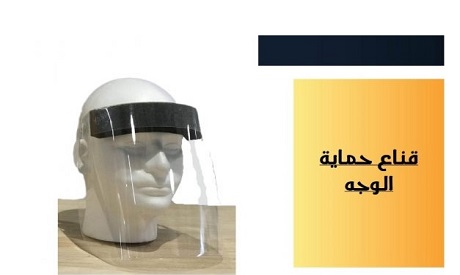
A model of the face protection mask manufactured by the National Endowments Investment Group (Photo: Ahram)
As countries around the world are ramping up domestic production of face masks and respirators to meet urgent needs of hospitals during the coronavirus outbreak, many public entities have entered the business to contribute to national efforts to provide protective gear.
On Thursday, the investment body of the Ministry of Religious Endowments in Egypt (Awqaf) announced it has set up a production line of protective masks in a move aimed at contributing to “boosting the protection of individuals and organisations against the coronavirus.”
The ministry’s National Endowment Investments Group said its new full-face mask provides complete protection for the face against droplets produced by breathing, sneezing and coughing which can enter through the eyes, nose or mouth and thus transmit the virus from one person to another.
Offered for sale at EGP 50 ($3.2), the multiple-use polycarbonate mask is designed to avoid external hand-to-face contact, a main factor of transmitting the disease, it said.
The ministry did not specify when the mask will be available or whether it will be sold at private outlets, local market or pharmacies.
The Egyptian Armed Forces was among the first entities to spearhead efforts to beef up domestic production of protective gear amid the outbreak, with the aim of securing supplies at a low price and ward off any shortage.
Now, the military’s manufacturing lines are producing 100,000 masks a day with reserves of five million, and 1,000 protective gowns a day, according to the head of the Egyptian Armed Forces Logistics Authority.
The military-produced face masks and disinfectants are currently distributed at factory price at dozens of military outlets and shopping marts across the country.
To wear or not wear
Some observers say the variety of the manufacturers of protective medical gear may have helped control the market, with products offered at a variety of qualities and prices.
While the outbreak has sparked global shortage of masks and other protective equipment, Egyptian officials had repeatedly said the country has protective products sufficient to cover all its medical needs.
Earlier this week, Egypt sent to Italy two military planes carrying medical supplies and last month it donated 1.5 million face masks to Italy, then the world's worst-hit country, to help it with its growing coronavirus crisis.
“The idea is not wearing a mask or not, it is about the fact that people must keep their hands clean all the time to avoid transmitting the disease to themselves or others,” Mahmoud El-Saadawy, head of the Pulmonology Department at Zagazig University, told Ahram Online, emphasising the importance of maintaining clean hands as the primary step before seeking other health protection steps or procedures.
His view is in line with the advice of the World Health Organisation (WHO) on the use of face masks to protect against the respiratory disease.
WHO has earlier said a healthy person only needs to wear a mask if they are taking care of a person with suspected coronavirus infection.
But in an updated advice earlier this week, the Geneva-based organisation said wearing a medical mask is one of the prevention measures that can curtail the spread of the virus but that using a mask alone is insufficient.
It said other measures should also be adopted, including maximum compliance with hand hygiene.
“The wearing of masks of whatever type or whatever specifications is an important protective procedure like keeping a safe distance of more than one metre in direct contact with other people and of course avoiding to sneeze at public or crowded places, but keeping clean hands remains the most effective way to avoid getting infected and in turn transmitting the virus to others," El-Saadawy said.
“A person wearing a full-face mask who is not regularly washing their hands can transmit the disease to himself after taking off the mask or even to another person by hand or surface contact,” he added.
“We cannot keep all the people protected by wearing masks, but if we guaranteed that the maximum number of people wash their hands effectively then we are eliminating the largest environment of the virus transmission and then come face protection products as an additional precautionary measure,” El-Saadawi concluded.
Short link: